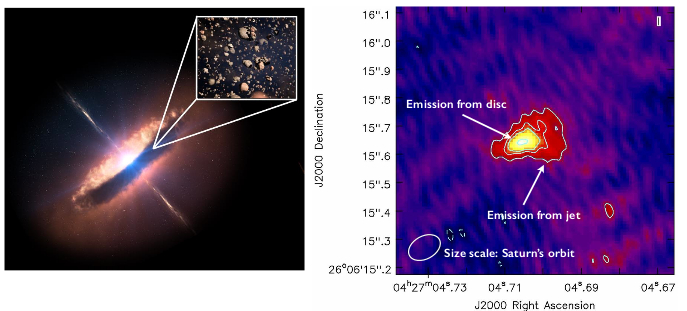| EPoS Contribution |
|
Understanding the Early Stages of Terrestrial Planet Formation in the DG Tau A Disc
Emily Drabek-Maunder Cardiff U, Cardiff, UK | |
| We present early commissioning results from Planet Earth Building-Blocks - a Legacy eMERLIN Survey (PEBBLeS). The PEBBLeS project is mapping "pebbles" (cm-sized dust grains) at a 5cm wavelength for a selection of protostars at a variety of evolutionary stages and masses. The survey focuses on nearby star-forming regions (120-230 pc) to systematically study discs that have the highest potential for planet-formation. The 40 milliarcsec angular resolution (i.e. beam diameter ~5-9 AU) allows us to separate zones in discs that are comparable to where terrestrial and gas giant planets form in our own solar system. The ability to image grains growing to pebbles within a few AU of young host stars is a unique eMERLIN capability, allowing the investigation of how planetary cores are made and the search for proto-planet candidates. We present commissioning results of the observations of DG Tau A (a flat spectrum protostar) at 4-6 cm wavelengths, where we find the disc to be both resolved and easily distinguished from regions with jet emission. We find the extended source flux to be significantly higher than predicted, suggesting a pile-up of dust grains with sizes around 1 cm, similar to the TW Hya archetype. We compare DG Tau A to the much weaker emission found from MWC 480 (Herbig Ae), which suggests variations in the dust spectral index and potentially in pebble production that can proceed toward planet formation. | |
 | |
| Caption: Left: Artist impression of a young disc with pebble- sized grains (RAS press release, J. Ilee, ESO/L. Calada/M. Kornmesser). Right: eMERLIN DG Tau A image at 4.1-4.6 cm with 3, 4, 5, 6σ contours. The disc is oriented SE-NW and a jet emerges SW. A significant amount of pebbles has been found within a Saturn radius (Drabek-Maunder, Greaves et al., in prep). | |
| Collaborators: J. Greaves, Cardiff, UK A. Richards, Manchester, UK R. Parker, UCLan, UK D. Ward-Thompson, UCLan, UK |
Suggested Session:
Protostellar disks |

